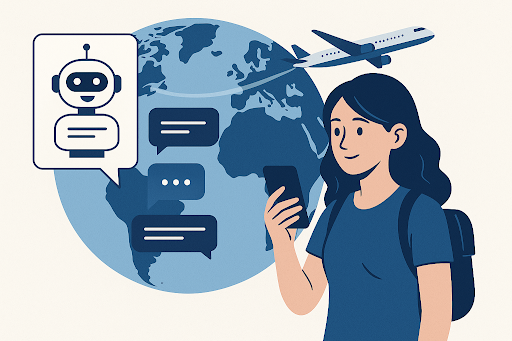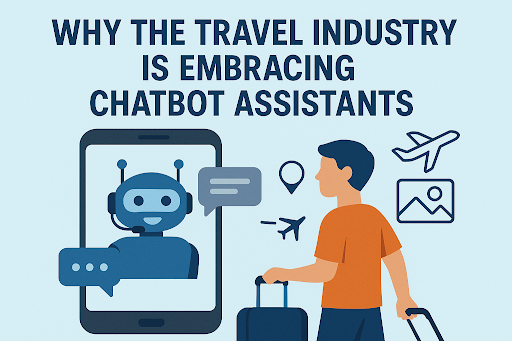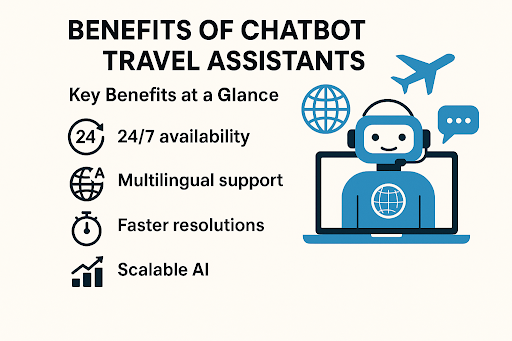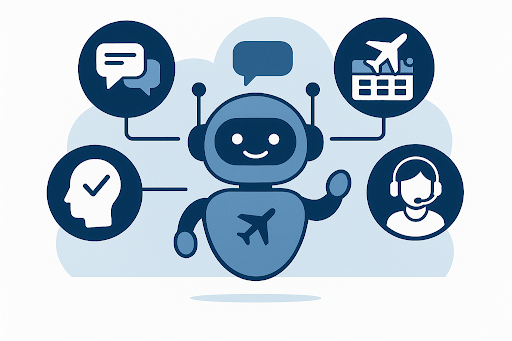
Travel
AI Travel Chatbot Assistants: 24/7 Support from Booking to Boarding
Introduction: The Evolution of Travel Customer Support

The customer support landscape in travel industry has experienced a substantial evolution during the past few decades. In past days travelers who needed help worked with call centers which employed human agents for assistance. The call centers functioned within limited hours and faced high demand challenges which resulted in lengthy waiting times and occasional inconsistent service delivery. Global travel growth and changing customer expectations made it essential to develop support systems that would be both efficient and accessible and reliable.
Technology development led to the replacement of voice-based support with digital communication channels. The traditional call center received competition from online self-service portals and live chat functions and mobile applications which started to supplement its services. Through digital interfaces travelers gained the ability to handle basic inquiries during any time of day thus improving their convenience and satisfaction levels. Smartphones became widespread which accelerated the shift toward digital support because it matched the fast-paced lifestyle of contemporary travelers.
The adoption of artificial intelligence (AI) has become essential for addressing modern customer expectations during the past few years. Travel websites together with booking platforms utilize AI-powered chatbots as essential components which simulate human conversational interactions. The solutions are built to manage various questions which include flight information and hotel reservations along with customized travel suggestions and problem-solving services. The latest AI chatbots incorporate human-like elements which emphasize empathy together with clear communication and user-focused design to connect automated processes with human interaction.
Key Milestones in Travel Customer Support
- Traditional call centers have transformed into digital platforms which provide instant support at all hours of the day and night.
- Travelers now rely mostly on online self-service tools combined with automated chat systems as their main methods for contacting support.
- Humanized AI chatbots deliver consistent support through handling both basic and advanced inquiries which enables them to operate at large scale.
- AI enables personalized proactive customer interactions which leads to travel experiences that feel smooth and satisfying for customers.
- AI tools undergo ongoing development to better understand traveler emotions while preserving conversation context and to transfer complex issues to human agents when necessary.
Why the Travel Industry Is Embracing Chatbot Assistants

The travel industry is rapidly evolving, driven by advancements in digital technology and shifting customer expectations. One significant trend is the widespread adoption of AI-powered chatbot assistants. These virtual agents now play a central role in how travel companies interact with their customers, improve operational efficiency, and deliver seamless experiences. Understanding the key drivers for this shift helps illustrate why chatbot adoption is becoming a strategic priority for industry leaders.
Growing Demand for Instant, Always-On Service
Modern travelers expect immediate assistance at any time, regardless of location or time zone. Chatbots address this need by offering 24/7 support without the limitations of traditional call centers. Whether a customer wants to confirm a booking late at night or resolve an urgent issue during their trip, chatbots ensure that timely answers are always available. This commitment to round-the-clock service enhances overall customer satisfaction and increases trust in the travel brand.
Increase in Tech-Savvy Travelers Seeking Self-Service
Today’s travelers are increasingly comfortable using digital tools and self-service platforms. They often prefer interacting with intuitive chatbots that provide instant information, rather than waiting in long phone queues. Chatbots can handle booking changes, provide tailored recommendations, and answer frequently asked questions—all within a familiar messaging interface. As expectations rise, the travel industry is embracing chatbots to meet and exceed these digital-first preferences.
Need for Cost-Efficient, Scalable Customer Support
Staffing call centers with human agents for global, 24/7 coverage can be expensive and challenging to scale during peak travel seasons. AI chatbots offer a cost-effective alternative, handling high volumes of routine inquiries simultaneously without compromising quality. This scalability means companies can allocate human resources to more complex tasks, streamlining operations and reducing overhead costs.
Key Benefits Summarized
- Instant, around-the-clock customer support.
- Enhanced self-service options for tech-savvy travelers.
- Scalable and cost-effective response to fluctuating demand.
- Improved customer satisfaction through fast, accurate answers.
- Efficiency gains for staff by automating routine processes.
By integrating chatbot assistants, the travel industry achieves a strategic blend of operational efficiency and customer-centric service that meets the ever-evolving needs of modern travelers.
Key Challenges with Traditional Travel Support

Providing excellent customer support in the travel sector is critical for ensuring traveler satisfaction and loyalty. However, traditional travel support models face several challenges that hinder service quality and operational efficiency. Today’s digitally savvy travelers expect instant, seamless assistance across channels and time zones—a standard that legacy support models often struggle to meet.
Slow Response Times and Limited Working Hours
Conventional support teams typically operate within set business hours and are constrained by human capacity. When travelers encounter issues outside these windows—such as during late-night flights or holidays—their ability to receive timely help is significantly reduced. This delay not only leads to frustration but can also escalate simple problems into major disruptions, negatively impacting the overall travel experience.
High Operational Costs
Maintaining a large team of travel support agents incurs substantial expenses. Costs include recruitment, training, salaries, overheads, and technology infrastructure. As customer queries grow in complexity and volume, especially during peak seasons, the strain on human resources becomes evident. Scaling up to maintain service standards often means higher costs, which can squeeze profit margins for travel providers.
Inconsistent Service Quality
With support teams dispersed across various locations and dealing with diverse languages and cultures, ensuring consistent and high-quality service is an ongoing challenge. Agents may interpret policies differently, possess varying levels of experience, or struggle with language barriers, leading to inconsistencies in how travelers’ issues are resolved. Such variation can erode customer trust and brand reputation.
Key pain points of traditional travel support:
- Delayed responses due to limited staffing and fixed hours.
- Substantial overhead from employing and managing large human teams.
- Service quality suffers from inconsistency across languages, regions, and agent experience levels.
Embracing advanced, human-centered AI-powered solutions can help overcome these obstacles-offering 24/7 support, reducing costs, and delivering a unified and personalized traveler experience.
Benefits of Chatbot Travel Assistants

In the rapidly evolving travel industry, integrating AI-powered chatbot assistants has become a game-changer for both travel businesses and their clients. Humanized and intuitive, these virtual travel experts work tirelessly behind the scenes, transforming the customer experience from first inquiry to post-trip support.
Providing 24/7 support, these chatbots ensure travelers never have to wait for answers—no matter the timezone. Whether a client faces a late-night flight change or needs last-minute hotel recommendations, help is always available. This round-the-clock availability not only prevents travel disruptions but also fosters a strong sense of reliability and trust between the traveler and their chosen brand.
The multilingual capabilities of AI chatbots break down language barriers by offering instant assistance in numerous languages. This global reach means travelers can communicate their needs confidently, assured they’ll be understood accurately-very time.
Travel chatbots also drastically reduce query resolution times. By instantly responding to frequently asked questions and automating repetitive tasks such as booking confirmations or itinerary updates, they enhance customer satisfaction. Travelers spend less time waiting for replies and more time enjoying their journeys, knowing they can resolve issues swiftly, even during peak travel seasons when traditional support staff may be overloaded.
Perhaps most impressive is a chatbot’s scalability. During high-traffic periods, like holidays or when unpredictable events occur, these AI assistants seamlessly manage a surge in inquiries without a drop in quality. This means no customer is left behind, and businesses avoid the cost and chaos of rapidly scaling up human staff in response to demand.
Key Benefits at a Glance
- 24/7 availability ensures travelers get help at any hour.
- Multilingual support accommodates global clientele.
- Faster resolutions increase customer satisfaction and loyalty.
- Scalable AI handles peak season inquiries smoothly.
Adopting an AI-powered chatbot is not just about efficiency-it’s about empowering travelers and offering a seamless, stress-free experience from day one.
Must-Have Features of Modern Travel Chatbots

Modern travel chatbots have become essential tools for delivering seamless, efficient, and personalized travel experiences. Their value lies in their ability to handle a wide variety of customer needs around the clock while maintaining a human-like, engaging interaction. To truly meet traveler expectations today, a travel chatbot must be equipped with several advanced features, all powered by sophisticated and human-centered artificial intelligence.
First and foremost, natural language processing (NLP) forms the backbone of an effective travel chatbot. By leveraging NLP, the chatbot can interpret user queries with a high degree of nuance and respond in a manner that feels genuine and conversational. This technology allows users to communicate naturally, using their everyday language, making each interaction more comfortable and accessible.
Seamless integration with booking engines, itinerary management, and flight status systems is another critical feature. By connecting directly to these systems, chatbots can deliver real-time updates, help users book or modify travel plans on the spot, and provide immediate, accurate information without the need to switch platforms.
Personalization further enhances user satisfaction. By analyzing traveler preferences and previous booking history, chatbots can tailor recommendations and anticipate needs, making each interaction uniquely relevant to the individual. This approach not only drives loyalty but also streamlines the planning process.
Contextual understanding enables chatbots to manage complex travel requests effectively. When a user’s inquiry involves multiple variables or requires remembering earlier parts of the conversation, contextual AI ensures accurate and efficient assistance.
Finally, advanced chatbots must include escalation protocols, allowing them to transfer users to a human agent if the conversation reaches a level of complexity beyond AI’s capabilities. This ensures that customers always receive the support they need, no matter the issue.
Key Features at a Glance
- Natural language processing for fluid, human-like conversations
- Integration with booking, itinerary, and flight status systems for real-time response
- Personalization based on traveler profiles and past booking data
- Contextual understanding to resolve complex, multi-step travel queries
- Swift escalation to human support agents when needed for exceptional service
Technology Stack and Investment Considerations for AI-Powered Chatbots
Harnessing AI-powered chatbots requires a strategic approach to both technology selection and investment planning. Integrating such solutions can transform customer engagement, operational efficiency, and service delivery, but it demands thoughtful attention to core frameworks, systems integration, privacy, and a clear cost-benefit analysis.
Core AI and Machine Learning Frameworks
Selecting robust artificial intelligence and machine learning frameworks is crucial for delivering sophisticated chatbot experiences. Natural language processing (NLP) engines form the backbone of AI chatbots, enabling them to interpret, process, and respond to human language with high accuracy and contextual understanding. Leading platforms like OpenAI, Google Cloud AI, and Microsoft Azure AI provide scalable NLP and machine learning capabilities tailored to various business requirements.
System Integration
Ensuring seamless integration with existing Customer Relationship Management (CRM), booking, and payment systems maximizes the value of AI chatbots. Effective integration allows chatbots to access customer data, process transactions, update records, and deliver personalized responses in real-time. This not only enhances user experience but also optimizes internal workflows and reduces manual intervention.
Data Privacy, Cybersecurity, and Compliance
Maintaining strict data privacy and security standards is essential when deploying AI chatbots. Organizations must comply with regulatory requirements such as GDPR and CCPA, ensuring all customer data interactions are encrypted, securely stored, and handled transparently. Implementing robust access controls, regular security audits, and clear data governance policies protects against breaches and builds user trust.
Cost-Benefit Analysis: Chatbot Deployment vs. Traditional Models
Modern AI chatbots offer significant advantages over traditional customer service models:
- Operational efficiency: Automate repetitive tasks, reducing response times and operational costs.
- Scalability: Handle large volumes of inquiries simultaneously without increasing staff.
- 24/7 availability: Provide continuous support, improving customer satisfaction.
- Personalized engagement: Leverage data to deliver tailored recommendations.
However, initial investments in development, integration, and compliance are counterbalanced by long-term savings and enhanced service quality.
Building Your Own Travel Chatbot Assistant
Creating an effective travel chatbot assistant involves a strategic approach grounded in understanding your users, leveraging appropriate technologies, and ensuring continuous refinement to meet evolving needs. A well-designed travel assistant can streamline booking processes, deliver personalized recommendations, and enhance the overall customer journey.
Defining User Needs and Key Customer Journeys
Begin by carefully mapping out your users’ expectations and typical travel behaviors. Identify their most frequent requests-such as itinerary planning, real-time assistance, or booking modifications. By understanding these priorities, you can tailor the chatbot’s functionalities to address genuine pain points and deliver a seamless travel experience.
Key Points:
- Analyze customer demographics and preferences through data collection and user interviews.
- Prioritize features that streamline booking, provide destination guidance, and handle support queries.
- Map user interactions to highlight where conversational AI can deliver the most value.
Selecting Technology Partners or In-House Development
Deciding whether to partner with external vendors or build the solution internally depends on your organizational strengths, resources, and long-term vision. Evaluate technology partners based on their expertise in AI-driven travel solutions, scalability, and integration capabilities.
Key Points:
- Assess existing technology infrastructure and team expertise.
- Compare vendor offerings for AI capabilities, customization, and support.
- Ensure any solution can integrate seamlessly with your travel platforms.
Training AI Models with Real Travel Scenarios
To deliver personalized and context-aware responses, train AI models on real travel scenarios. Feed your models with user journeys, frequently asked questions, and actual booking data to enhance performance and accuracy.
Key Points:
- Use authentic travel data and conversations when training AI models.
- Continuously update datasets to reflect new travel trends and behaviors.
- Validate chatbot accuracy through simulated user interactions and testing.
Continuous Improvement with User Feedback Loops
Incorporate user feedback mechanisms to ensure ongoing enhancement of the chatbot experience. Analyze feedback and metrics to identify areas for improvement and prioritize updates that drive user satisfaction.
Key Points:
- Implement surveys, chat ratings, and feedback forms post-interaction.
- Use analytics to monitor chatbot performance and conversational patterns.
- Establish a routine review process for iterative updates and improvements.
For further discussion or a personalized consultation, please schedule a meeting via the following link: Meeting Link
Case Studies: Success Stories in Travel Chatbots
In recent years, airlines, OTAs, and leading hotel chains have harnessed the power of AI chatbots to radically improve customer experience, reduce support costs, and deliver rapid service at scale. By deploying conversational tools across channels like WhatsApp, web apps, and messaging platforms, these organizations are meeting travelers’ growing expectations for real-time, personalized support and convenience.
Transforming Customer Experience: Leading Success Stories
With increasing digital adoption, travel companies have moved fast to automate booking, inquiry handling, and specialized tasks. Here’s a look at how chatbots made a measurable difference:
- Flight Chatbots: Airlines worldwide have implemented AI-powered assistants on WhatsApp and proprietary apps to streamline ticket booking, flight status queries, and check-ins. These chatbots can handle surges in customer inquiries without extra staffing, cutting operating costs by 30% while maintaining high service standards.
- Example: Leading airlines report that chatbots now resolve over 50% of traveler questions in under one second, yielding higher customer satisfaction and freeing up human agents for complex issues.
- Additional service areas include flight upgrades, airport navigation, and refund requests - all performed instantly and available 24/7, especially useful during peak travel and unforeseen disruptions.
- Hotel Chatbots: Major hotel groups have integrated AI chatbots within their websites, WhatsApp channels, and loyalty apps to automate reservations, guest queries, and personalized recommendations. Chatbots now manage up to 80% of guest interactions, offering always-on concierge support and room service requests.
- Example: Accor Hotels and Four Seasons empowered guests to personalize their stay with virtual concierge access, boosting satisfaction scores and increasing upsell revenue through tailored suggestions.
- Hotels also use chatbots to optimize check-ins, simplify amenity bookings, and deliver local recommendations, resulting in more memorable guest experiences and significant labor savings.
- OTA and Bus Chatbots: Online travel agencies and bus operators deploy AI chatbots to address routine questions, manage bookings, and proactively resolve common issues, reducing call center loads while ensuring travelers get quick support.
- Example: Integrated chatbots on channels such as WhatsApp have increased booking conversions by up to 30% and driven greater customer loyalty through proactive, real-time updates.
WhatsApp Chatbot Integration
Connecting travelers via WhatsApp represents a critical innovation. Whether for flights, hotels, or bus bookings, WhatsApp chatbots deliver instant communication, facilitate booking and support, and keep travelers informed at every step - enhancing satisfaction and reinforcing brand trust through natural, conversational engagement.
Key Benefits at a Glance:
- Reduced operational and support costs (up to 30%) for airlines and hotels
- 24/7 multi-channel presence and multilingual, instant support
- Improved guest and passenger satisfaction scores and higher conversion rates
- Greater personalization, upsell opportunities, and staff efficiency
Travel chatbots have moved from novelty to necessity, reshaping the customer journey and setting new standards across the industry.
The Future: Chatbots and the Next Wave of Travel Support
As the travel landscape evolves, the integration of AI-powered chatbots, voice assistants, and predictive analytics is transforming how organizations deliver support to travelers. This new era promises not only greater efficiency and convenience but also a deeply personalized and proactive experience at every stage of the journey.
The Convergence of AI, Voice Assistants, and Predictive Analytics
Chatbots equipped with advanced AI and natural language processing are becoming the backbone of customer support in travel. Voice assistants now allow travelers to book flights, hotels, or rentals through natural conversation rather than navigating complex forms. Predictive analytics empowers these virtual assistants to anticipate passenger needs, from suggesting travel deals to providing updates about disruptions or changes in real time. By drawing insight from historical and real-time data, these systems forecast potential issues, adjust recommendations, and help companies deploy resources optimally.
Opportunities for Hyper-Personalization and Proactive Service
Emerging AI technologies push beyond simple automation by enabling hyper-personalization. Chatbots learn from past behavior, preferences, and contextual cues to make tailored recommendations—suggesting unique accommodations, local activities, or even alternative travel options based on current trends and user profiles. This proactive approach not only prevents issues before they arise but also elevates overall satisfaction, creating memorable, individualized experiences for every traveler.
Role of Chatbots in Crisis Management and Real-Time Solutions
AI-powered chatbots play a critical role in crisis management by providing immediate information, rerouting travelers, and offering actionable solutions during disruptions such as flight cancellations or natural disasters. These digital assistants work tirelessly, responding to thousands of simultaneous inquiries and handling straightforward support requests, thus freeing up human agents to focus on complex or sensitive situations. By bridging automation with human empathy, chatbots ensure travelers remain informed and connected—even in the most stressful scenarios.
Key Points Recap
- AI chatbots streamline booking and deliver faster, 24/7 support.
- Voice-assisted travel simplifies tasks with natural speech interactions.
- Predictive analytics drives personalized, context-aware recommendations.
- Hyper-personalization turns trips into unique, proactive experiences.
- Chatbots manage real-time crises, ensuring resilience and customer satisfaction.
The next wave of travel support is intelligently humanized by AI, setting a new standard for seamless, responsive, and deeply personalized service in the travel industry.
Conclusion: The Imperative for Chatbot Adoption in Travel
The travel industry is undergoing rapid digital transformation, and customer expectations for swift, seamless support are higher than ever. As travelers increasingly demand instant information, personalized interaction, and 24/7 availability, traditional customer support channels often struggle to keep pace. This is where AI-powered chatbot assistants become essential-not only as a convenience but as a strategic necessity for travel brands seeking to maintain a competitive edge.
Chatbots powered by advanced, humanized AI seamlessly integrate with customer support operations to deliver fast, accurate, and empathetic responses. These tools learn from every interaction, improving their ability to mirror human conversation, understand traveler needs, and provide tailored solutions. By adopting these intelligent assistants, travel brands can elevate customer satisfaction, reduce response times, and free up valuable staff resources for complex, high-value interactions.
Why Travel Brands Should Act Now
- Enhanced Customer Experience: AI-driven chatbots deliver quick, relevant answers anytime, anywhere, ensuring travelers feel supported throughout their journey.
- Scalability: Handle high volumes of inquiries simultaneously without compromising quality or increasing overhead costs.
- Personalization: Advanced chatbots recognize returning customers, remember preferences, and offer recommendations that feel truly individualized.
- Operational Efficiency: Automate repetitive tasks, allowing human agents to focus on more nuanced and emotionally sensitive requests.
- Competitive Advantage: Early adoption of humanized AI chatbot solutions signals innovation and responsiveness, setting a brand apart in a crowded marketplace.
- Actionable Insights: AI chatbots capture and analyze conversations, providing valuable data to refine offerings and improve future service.
The need for advanced, human-like chatbot assistants is no longer a future consideration but a present-day imperative. Whether your brand is exploring, piloting, or ready to upgrade chatbot solutions, the journey starts with a single step toward smarter, more empathetic support.
To discover how tailored chatbot solutions can transform your customer support, Contact Us. Our team is ready to guide you in implementing AI tools that truly humanize travel customer interactions.

Your Tech Partner for Scalable Travel Growth
We’re here to help you shape your business, so reach out to us today.